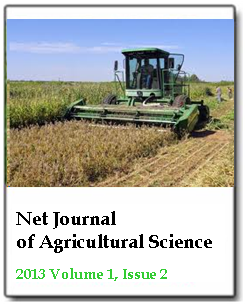Assessment of agricultural extension strategies for poverty alleviation in Imo State, Nigeria
F. N. Nnadi, J. Chikaire, J. A. Echetama, R. A. Ihenacho and C. O. UtaziNet Journal of Agricultural Science
Published: April 8 2013
Volume 1, Issue 2
Pages 17-23
Abstract
This study was aimed at identifying the various ways agricultural extension would enhance poverty reduction. The specific objectives were to describe the socio-economic characteristics of the respondents, identify agricultural extension strategies for poverty reduction among the respondents, identify the roles agricultural extension play in reducing poverty among the respondents and determine the effectiveness of the strategies. A structured questionnaire was administered to 78 contact farmers and 42 extension agents purposively selected in Imo State. Information obtained was analyzed using frequency distribution tables and percentages. The information obtained shows the major agricultural extension strategies for poverty alleviation. These include participatory extension service, community empowerment and formation of farmer associations amongst others. Several roles played by agricultural extension in alleviation poverty among the respondents in the study area include improved livelihood, education of farmers and increased production amongst others. Agricultural extension should be decentralized, while empowering communities as well as people in the same vein so as to effectively meet the needs of the people. Infrastructures and social amenities should be provided, that will boost production, raise income of farmers and gradually drive them out of poverty.
Keywords: Extension, poverty, education, empowerment, participation.
Full Text PDF
